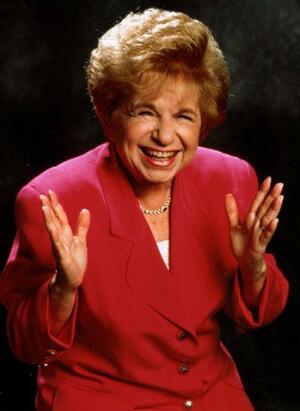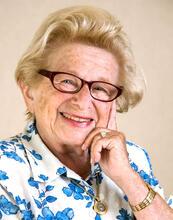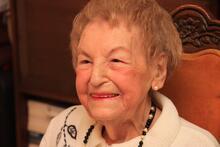Ruth Westheimer
Born in Germany in 1928, Ruth Westheimer survived the Holocaust because her mother sent her to a Swiss orphanage after Kristallnacht. After the war she went to Palestine, joined the Haganah, studied in Paris, and finally came to the United States. She had received her Ed.D. from Columbia when a guest appearance on a radio talk show led to a show of her own. With a genius for communicating joy in human sexuality—derived from Orthodox Judaism—she went from success to success. She appeared on prime-time news and late night talk shows, wrote a series of best-selling books, and generally exploited all avenues of communication for her message that sex is a wholesome part of the human experience.
In the last two decades of the twentieth century, there were many reasons not to celebrate sex. The fear of AIDS brought to the surface the connection between passion and death that has always been a dark strain in the human mind. A fundamentalist Christian reaction against the sexual revolution threatened to re-enthrone Puritan values. On the other side of the coin, millions of children were bearing children. Against this desolate background, a cheerful Jewish grandmother who called herself Dr. Ruth marched forward and said, with undeniable sincerity and forthright common sense, that sex was good, indeed “heavenly.” To the astonishment of many Americans, who tend to associate religion with sexual repression, Ruth Westheimer declared that her message of liberation had its origin in Orthodox Judaism.
Early Life, Family, and Education
Karola Ruth Siegel was born in Germany on June 4, 1928, the daughter of Irma Hanauer, a housekeeper, and Julius Siegel, a notions wholesaler and son of the family in which Irma worked. Julius Siegel gave his daughter an early grounding in Judaism, taking her regularly to the synagogue in Frankfurt, where they lived. When Karola was ten years old, shortly after the infamous Kristallnacht, her father was taken to a detention camp. Her mother and grandmother then sent the little girl to Switzerland, where she lived in an orphanage for six years.
After the war, unable to find any other members of her family, sixteen-year-old Karola went to Palestine. There, she lived on a number of A voluntary collective community, mainly agricultural, in which there is no private wealth and which is responsible for all the needs of its members and their families.kibbutzim and joined the Haganah, the underground army. Later, she taught kindergarten, before going with her first husband to Paris, where she studied at the Institute of Psychology at the Sorbonne. After a divorce, she came to the United States.
In New York, she entered the New School for Social Research on a scholarship for victims of the Holocaust. While studying, she married her second husband and gave birth to her first child, Miriam. After a second divorce, she met Manfred Westheimer. They were married in December of 1961, and their son Joel was born in 1964. The next year, Ruth Westheimer became an American citizen, and, in 1970, she received her EdD from Columbia University.
Becoming a Sex Therapist
After working in a number of positions involving sex education, family planning, and sex therapy, Westheimer found her niche when she did a guest appearance on a local radio show. The audience response was so positive that she was soon hosting her own show, Sexually Speaking. Beginning in 1980 as a fifteen-minute embellishment to the station’s schedule, it quickly expanded to an hour and finally to two hours.
Westheimer proved to have a real genius for communicating joy in human sexuality while at the same time informing her audiences about responsibility, sexually transmitted diseases, and safe sex. The diminutive woman with her appealing accent was equally successful on television. She hosted her own program—variously called Good Sex! with Dr. Ruth Westheimer, The Dr. Ruth Show, and Ask Dr. Ruth—but her national reputation came from appearances on such network programs as Nightline, CBS Evening News, the Tonight Show, and Late Night with David Letterman.
In 1983, Westheimer published her first book, Dr. Ruth’s Guide to Good Sex. She later wrote more than forty others, including her autobiographical works All in a Lifetime (1987) and Musically Speaking: A Life through Song (2003).
In 1995, Westheimer co-authored Heavenly Sex: Sexuality in the Jewish Tradition, with Jonathan Mark. Drawing on traditional Judaic sources, it grounds the famous sex therapist’s philosophy in Orthodox Jewish teaching. While some have suggested that the authors ignored the darker side of the classical Jewish dialectic on the subject, it is difficult to ignore the cultural significance of both the book and Dr. Ruth.
As David Biale asked, “What does it mean for America’s best-known sex therapist to make Judaism the basis of a contemporary sex ethic? If Freud had claimed to have created the science of sexuality by destroying the ‘illusion’ of religion, Dr. Ruth reverses the course: It is precisely on the basis of religion—Judaism—that a truly healthy contemporary science of sexuality might be constructed.”
In 1991 Westheimer donned the title of “executive producer” for a documentary on Ethiopian Jews entitled Surviving Salvation. Her second PBS documentary, entitled No Missing Link, described how grandparents transmitted values, particularly religious values, during the seventy years of communism in Russia.
In 1994 Westheimer entered cyberspace with Dr. Ruth’s Encyclopedia of Sex on CD-ROM. Two hundred and fifty entries dealt straightforwardly with all areas of sex and sexuality. Westheimer followed it up with Sex for Dummies, in the famous series of how-to manuals. She told USA Today that her first reaction to the idea of the book was negative. “When they approached me, I said, ‘Absolutely no, I do not talk to dummies. I talk to intelligent people.’” She changed her mind, however, when she recognized the irony of the titles and their disarming appeal to a wide segment of the population. “And then I said, hold it, if I can prevent one unintended pregnancy, one person from getting AIDS, one person from getting a sexually transmitted disease, it will be worth it.”
This determinedly optimistic, affirmative, and wholesome approach left Westheimer open to criticism and satire. It is a testament to the endurance of the human spirit that someone who was exposed to the horrors of humanity and experienced great sorrow at an early age was able to look away from the darkness and toward the light. As she told a Reuters interviewer at the 1995 Frankfurt Book Fair, “I was kicked out in 1939 by being placed on a train right here in Frankfurt.... I never saw my parents again. Every time I am sad I just have to think about my five-year-old grandson. Hitler didn’t want me to have that grandson. I put the picture of my grandson in my mind and say—You see, we did triumph. So I do therapy on myself.”
Honors and Recognition
In May of 2000 Westheimer received an honorary doctorate from Hebrew Union College-Institute of Religion for her work in human sexuality and her commitment to the Jewish people, Israel, and religion. In 2001 she received the Ellis Island Medal of Honor and the Leo Baeck Medal, and in 2004, she received the degree of Doctor of Letters, honoris causa, from Trinity College. She also has an honorary doctorate from Ben-Gurion University, which founded a scholarship program in her name.
Westheimer wrote more than 40 books. In the twenty-first century, she published about a book a year—often with co-author Pierre Lehu—including Dr. Ruth’s Guide for the Alzheimer’s Caregiver in 2012 and, in 2017, Rollercoaster Grandma!: The True Story of Dr. Ruth. A documentary about her life and work, Ask Dr. Ruth, was produced by Hulu in 2019. Her life story was also detailed in a play, “Becoming Dr. Ruth” (originally premiering in 2013), which had a notable off-Broadway revival in 2021 starring Tovah Feldshuh.
Westheimer was an Associate Fellow of Calhoun College at Yale University. She also held fellowship positions at Princeton and the New York Academy of Medicine. She was active on the board of the Museum of Jewish Heritage. In November 2023, she was named as New York State’s first “ambassador to loneliness,” part of her mission to fight social isolation and improve the well-being of people, not just in their sexual lives but overall.
Ruth Westheimer died on July 12, 2024.
Selected Works
The Doctor Is In: Dr. Ruth on Love, Life, and Joie de Vivre. Seattle: Amazon Publishing, 2015.
The Olive and the Tree: The Secret Strength of the Druze. Brooklyn, NY: Lantern Books, 2007.
Musically Speaking: A Life Through Song. Philadelphia: University of Pennsylvania Press, 2003.
Conquering the Rapids of Life: Making the Most of Midlife Opportunities, with Pierre A. Lehu. Lanham, MD: Taylor Trade Publishing, 2003.
The Lover’s Companion: Art and Poetry of Desire, ed. by Charles Sullivan. New York: Harry N. Abrams, 2003.
Dr. Ruth: Grandma On Wheels. Saugus, MA: Golden Books, 2001.
Who Am I? Where Did I Come From?, with Pierre A. Lehu. Saugus, MA: Golden Books, 2001.
Power: The Ultimate Aphrodisiac, with Dr. Steven Kaplan. Seattle: Madison Books, 2001.
Human Sexuality: A Psychosocial Perspective, with Dr. Sandy Lopater (college textbook). Philadelphia: Lippincott Williams & Wilkins, 2001.
Rekindling Romance for Dummies, with Pierre A. Lehu. Hoboken, NJ: For Dummies, 2001.
Dr. Ruth’s Guide to College Life, with Pierre A. Lehu. Seattle: Madison Books, 2001.
Dr. Ruth’s Pregnancy Guide for Couples, with Amos Greenbaum, MD. New York: Routledge, 1999.
Grandparenthood, with Dr. Steven Kaplan. New York: Routledge, 1998.
Heavenly Sex: Sexuality in the Jewish Tradition, with Jonathan Mark. New York: New York University Press, 1995.
Sex for Dummies. Hoboken, NJ: For Dummies, 1995.
Dr. Ruth’s Encyclopedia of Sex. New York: Continuum International Publishing Group, 1994.
All in a Lifetime, with Ben Yagoda. New York: Warner Books, 1987.
Dr. Ruth’s Guide to Good Sex. New York: Grand Central, 1983.
Beard, Alison. “Life’s Work: An Interview with Ruth Westheimer.” Harvard Business Review, April 2016.
Bennett, Jessica. “Dr. Ruth Says ‘Make Time’ for Sex. Millennials, She’s Looking at You.” New York Times, May 2019.
Biale, David. “Dr. Ruth’s ‘Heavenly Sex’: Are Jews ‘A Sexual Light Unto the Nations’?” Forward, October 6, 1995, and “Review of Heavenly Sex,” Ethnic Newswatch, October 1995.
Bielski, Zosia. “What We Talk About When We Talk About Sex: New Documentary Examines How Ruth Westheimer Helped Bring Sex Ed Out of the Dark Ages.” The Globe and Mail, May 7, 2019.
Haas, Nancy C. “Everything You Ever Wanted to Know About Sex ... And a Few Things You Didn’t Are Spelled Out in Westheimer’s Latest Tome.” Forward, July 29, 1994.
Majendie, Paul. “For Sex Therapist Dr. Ruth, Homecoming Is Agony.” Reuters, October 12, 1995.
Painter, Kim. “How Dr. Ruth Was Seduced into Writing ‘Sex For Dummies.’” USA Today, September 10, 1995.
“Ruth Westheimer.” Gale Contemporary Authors, updated Sept. 30, 2016.
Schwartz, Bruce. “Dr. Ruth Brings Therapy to Cyberspace.” USA Today, November 11, 1994.






